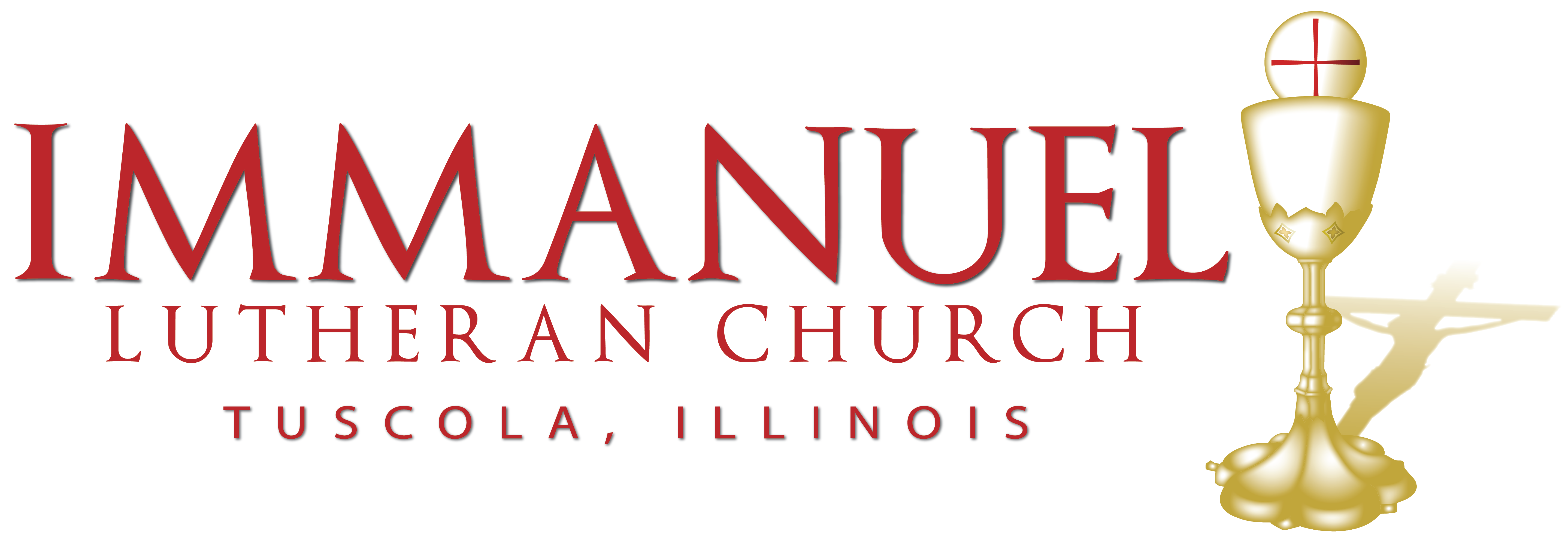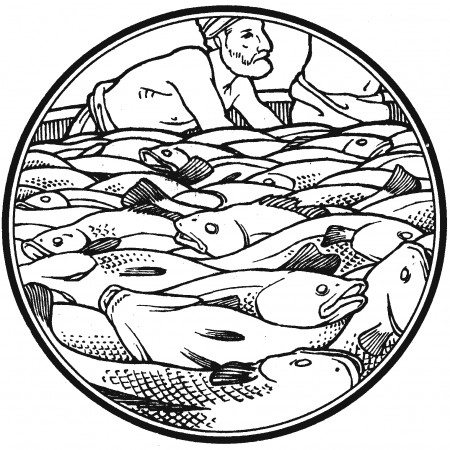The Fifth Sunday after Trinity
- Old Test: 1 Kings 19:11-21
- Epistle: 1 Pet. 3:8-15
- Gospel: Luke 5:1-11
The Lord called fishermen to be fishers of men (Luke 5:1-11). The net they would use is the message of the cross, which is foolishness and a stumbling block to the world (1 Cor 1:18-25). The power of God to save is not in spectacular signs like wind and fire and earthquakes (1 Kings 19:11-21), nor is it to be found in human intelligence and wisdom. The power of God to save comes in the still, small voice of the preaching of Christ crucified. In worldly darkness the disciples could catch nothing. But in the light of Christ whose Word was attached to the water, the boats were filled with fish. So it is that in Baptism you have been drawn in to the ship of the church. Though the nets are breaking and some who hear the Word do not believe, pastors continue to cast the net of the Gospel and the Sacraments, that you fish may abide in the boat of the Church and that you may be ready to give a defense to everyone who asks you a reason for the hope that is in you (1 Peter 3:8-15).
Sermon Text
+ IN NOMINE IESU +
St. Luke tells us as that once Peter, James, and John had brought the boats ashore, they left everything and followed Jesus. In the accounts of Matthew and Mark of this text, Jesus explicitly calls them to follow him. And elsewhere, Jesus himself commands those would follow Him to leave everything behind. To the rich young ruler, Jesus says, “Sell all that you have and then follow me.” To the great crowds that followed him around as he taught, Jesus said, “If anyone comes to me and does not hate his own father and mother and wife and children and brothers and sisters, yes, and even his own life, he cannot be my disciple. Whoever does not bear his own cross and come after me cannot be my disciple. . . . any one of you who does not renounce all that he has cannot be my disciple.” The question is what does our Lord mean and does He mean it? In other words, what does it mean to leave everything to follow Him? And in answering the first, we will answer the second.
Consider then the events that took place on the lake of Gennesaret, also known as the Sea of Galilee or Sea of Tiberias. Summarize the story . . . .
So Peter, James, and John leave everything. First, they leave everything by listening to God’s word instead of relying upon their own knowledge and insight. They are the professionals, but even their understanding, wisdom, and experience must submit to the word of God. So, despite their expertise, they leave it behind and follow the Word of God, that is, they do what it says. That’s the first way they left everything to follow Jesus. They set aside all things they thought they knew, all the things they thought would work and wouldn’t work, all their expertise in life and submitted it to the word and will of God.
Second, they left their careers as fishers of fish behind to learn to be fishers of men. They dropped their nets. They docked their boats. They abandoned the fish they just caught. The ditched it all and followed Jesus that they would become fishers of men.
God calls all of us to leave everything in the first way, and some of us to leave everything in the second way. Let me explain:
He calls Peter, James, and John to become fishers of men. Just as he will later call Levi from the tax booth and Paul from making tents, and the other apostles to catch men alive with the net of God’s word of Law and Gospel. But our Lord doesn’t call all of us to this service. He doesn’t call all of us to leave our careers so that we can travel around to preach and teach the Word of God.
The same goes for the rich young ruler. He doesn’t call all of us to sell everything we have to follow him. He called the rich young ruler to do this because he trusted in His riches and His works. So, Jesus preaches the law to him to crush his pride, bring him to repentance to believe that Jesus is the only way. So, not everything that our Lord tells someone in the bible to leave everything, does he mean that we should leave everything. Sometimes he is speaking to specific people in specific circumstances and tells them to leave everything because what they cling to is getting in the way of their salvation. So if you trust in your wealth, if your father, mother, brother, sister, son, daughter, grandchildren, and even your country are getting in the way of what God is calling you to do, which he reveals in his word, then yes, you should leave them behind to follow him.
But he calls all of us to submit our minds (thoughts), hearts (feeling and will), and our deeds to the will of God that is revealed in his word. No matter how smart you are, no matter how much experience you have in a given arena of life, no matter how much expertise you may have, all of it is to be left behind to follow Jesus in listening to his word.
But we struggle like Peter. We know that God’s Word works. We know that it is living and active, powerful and sharper than any two-edged sword. We know that all Scripture is God breathed and profitable for teaching, for reproof, for correction, and for training in righteousness that the man of God may be competent, equipped for every good work. We know that God’s word is truth and spirit and life.
We know that it was the power of the Word that created all things and put everything in the universe in its proper place. We know that it was the power of the Word that brought Moses and the people of Israel out of Egypt and through Red Sea. We know that it was the power of the Word that conquered Jericho when Joshua and the people crossed the Jordan into the land of promise. We know it was the power of God’s word that brought victory to Gideon and his 300 against the vast numbers and might of Midian. We know it was by the power of the Word that our Lord made the blind see, the deaf hear, the lame walk, the lepers cleansed, the dead live, and sinners into saints. We know all this. We confess this to be true. But we often struggle to believe it. We struggle to trust that God will do what he says. That his Word will work in our lives.
And when we doubt what God says, we, like Peter, ask the Lord and his word to depart from us. We seek our own way, our own solution. We try to take control of things to force the outcome we desire, instead of trusting the outcome that God desires.
And so we question whether Paul in Ephesians 5 really knows what he’s talking about with regard to marriage when he tells wives to submit to their husbands and husbands to die for their wives because we know that he wasn’t married. We think: what does he know, he was never married. But that is Scripture. That is God’s Word.
Or we hear that our Lord tells us in Mattthew 18 to confront our brothers and sisters in Christ when they have sinned. And perhaps, we do this. But we question whether we should follow the rest of his teaching. That if they don’t repent to take one or two other with us, and if that doesn’t work then to take it to the church so that they may be dealt with in the assembly of believers. Instead, we hide their sin, especially from the church. That won’t work, we think.
We hear our Lord teach us to receive the sacrament often, to gather together to receive his gifts so that He may impart to us the forgiveness of sins, and where there is the forgiveness of sins, there is life and salvation. We know this. We believe this. But we listen to people outside the church that tell us gathering together will kill us or that taking the Lord’s supper, the medicine of immortality, will do us harm.
We all stumble over what God directs us to do and to say. We all hold on to our own understanding, we all listen to our inner counsel and counsel from outside of the church and God’s Word. And sometimes, we give that more weight than the Word of God. What are those things is your life? And when you uncover them, when you see that you have sinned against God and his Word, don’t ask our Lord to depart like Peter did. Ask him to forgive. Ask him to stay with you and give you the strength to trust and believe what He promises, not just for the life to come, but for here and now.
That is why Jesus came. He came to seek and save the lost. He came to seek and save us. He came to call us back to himself, to make us children of God, and so we are, by the power of his word and work. This is why he died the death we deserve. This is why he was raised again. This is why He instituted baptism, holy absolution, and the Lord’s Supper.
Peter learned his lesson. He came to know that nothing can harm us if we are zealous for what is good. “Whoever desires to love life and see good days,” he says, “let him turn away from evil and do good; let him seek peach and pursue it.” To do what is good, to seek peace, is nothing other than hearing the Word of God, keeping it, and doing it, trusting that what God promises to do in that Word, He will accomplish just as he said he would, just as he did with Moses, Joshua, Gideon, and all the miracles of Jesus. Our God has prepared for those who love Him good things that surpass all our understanding. May He pour into our hearts such love toward Him that we, loving Him above all things, we may obtain what He promises, which exceed all that we can desire. Amen.



0 Comments